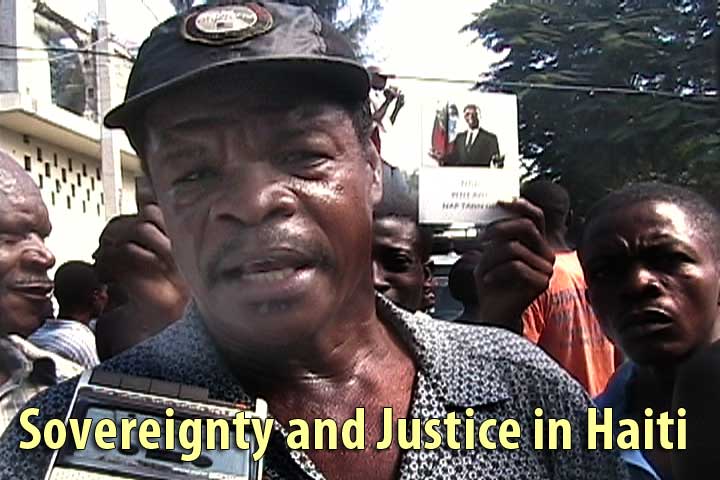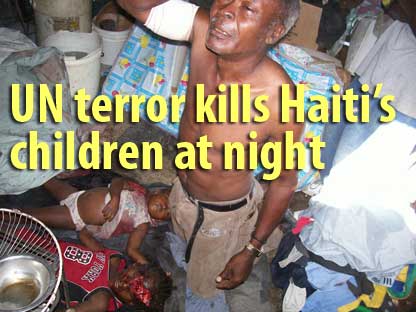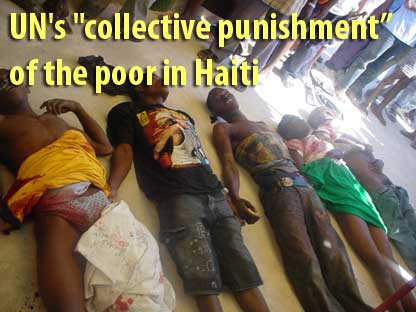|
Sovereignty and Justice in Haiti : Part 2
March 4, 2007
|
News
HaitiAction.net
|
||||
 |
 |
 |
 |
 |
 |
 |
| ©2007 Haiti Information Project Lovinsky Pierre Antoine — in Bel Air — one of the organizers of the December 16, 2006 demonstrations throughout Port au Prince, Haiti |
Sovereignty and Justice in Haiti
by Darren Ell
Part two of a two-part interview for the Haiti Information Project
Lovinsky Pierre-Antoine is the coordinator of Haiti's Fondasyon Trant Septanm (September 30th Foundation) ithat works with the victims of the coup d'états of 1991 and 2004. As a young man, Pierre-Antoine worked on literacy projects with street children in his hometown of Port de Paix. After moving to Port au Prince and completing his training as a psychologist, he began creating organizations such as: Fondsayon Kore Timoun Yo (Foundation for the Support of Children) for young street children in Port au Prince ; FAM (Foyer pour Adolescentes Mère), a centre for teenage mothers ; and Map Vivre ("I Live"), a program designed to give psychological and medical aid to the victims of the first coup against Aristide in 1991.
Pierre-Antoine came to realize that the suffering of the victims of the coup d'états needed to be dealt with in more than just a psycho-medical manner. As a result the September 30th Foundation was founded, which began healing the scars of victims by addressing the social, economic, political and legal roots of their suffering. To this end, he began working extensively with the Bureau des Avocats Internationaux (BAI), the leading legal organization addressing human rights issues in Haiti today.
Darren Ell (DE): Your organization, Fondazyon Trant Septanm (30th of September Foundation) works on behalf of the victims of the coup d'états of 1991 and 2004. Who are the victims and what happened to them?
Lovinsky Pierre-Antoine (LPA): First of all, it's important to remember that the coup d'état of 2004 is a continuation of the coup of 1991. The coup of 1991 was orchestrated by George Bush the First and the coup of 2004 by George Bush the Second. But when we consider the issue from the point of view of the victims, it's still the same poor population that is the victim. It's always the poor that pay the price. They are always the targets of repression because the political organization of President Aristide, Fanmi Lavalas, is extremely popular among the poor in Haiti. It's the political preference of the majority of the population. This is why the repression of 1991 struck at the them, just as the de facto regime of Gérard Latortue terrorized the people of Cité Soleil, Bel Air and other areas
DE: Let's talk about the victims of these crimes. A well-known British journalist, Robert Fisk, was recently in Montreal. When talking about the Palestinians, he said that each time a Palestinian gets up in the morning, it's still 1948, or 1967, or 2000; he still lives with the consequences of those years. He still has the years of repression in his mind. The past is present in his mind. For us - in Canada, in the US, in France - the past in other parts of the world is over. We forget it. But for some people here in Haiti, it's still 2004; the coup d'état of 2004 in which my country, Canada, participated, is still in their memory. Can you talk to us about the scars of the coup? Do you know the victims? What are they experiencing now?
LPA: I am in permanent contact with the victims of the coup d'état of February 2004. These are people who carry with them the trauma of the coup: torture sessions, scenes where children see their mother or father killed, horrible situations where young children die from the bullets fired by the occupation forces. They have not been able to leave the trauma behind them in order to look to the future.
I studied in Canada, and I know that you have an impressive arsenal of structures and institutions to reintegrate people once they experience shock or trauma. In Haiti, we don't have that. We have a very small number of psychologists and psychiatrists to help these people. What's more, this small number of mental health professionals is concentrated in Port-au-Prince. There is no way to help people process their trauma and continue life as before.
The past is still alive in their minds. Take for example a drawing session recently organized by the Canadian Embassy with children in Cité Soleil. Trauma runs right through all their drawings. Violence is omnipresent in the minds of these children. This has serious consequences in terms of relationships and academic performance. It's unfortunate that the present Haitian authorities haven't put in place the structures that could help these children get through this difficult time.
DE: What about adults? How is trauma affecting their lives today? How are the effects of these traumatic events revealed in the daily lives of the people who experienced them?
LPA: These people wake up in the middle of the night with terrifying nightmares. These are people who now find it difficult to trust others. The ties that unite people are broken. Many people are having trouble getting over what they lived through. This creates a situation of dependency. Take for example a person who was once economically independent, who had a small boutique, a little business. It was all completely destroyed by the two years of the coup d'état. We now have people who are completely dependent and others who now offer them charity. I tried with some people to find the funds to help them rebuild their businesses, but one month later I would find them living like beggars.
DE: They are unable to function.
LPA: Unable. It's very very difficult for them to start functioning socially once again.
DE: We were all shocked by a fact established by The Lancet study; that is, the cases of sexual assault. We've already seen this in other countries. I think for example of the Russian troops during the liberation of Germany or the former Yugoslavia. Is the situation of Haitian women being discussed? Are there services in place for them? How have they been affected by all of this? We're talking here about 35,000 women raped in a two-year period. It's difficult to comprehend.
LPA: As you said, this situation happened in Haiti as it did in other countries. During the last coup d'état, rape was used as a weapon by the former military, by the people who carried out the coup against the women of the poor neighborhoods and particularly against women whose partners or husbands were active in Lavalas.
DE: So, it was a political weapon.
LPA: Yes. But don't forget that in Haiti the subject is very taboo. So many women who went through it never spoke about it.
DE: So the number could actually be higher.
LPA: Probably, because women here who are victimized by rape are practically quarantined and become scorned by society. And there are no structures in place to help them. But there is also another problem. I worked with women who were victims of rape during the first coup d'état against Aristide. Even though a small number of women who were able to get help, their cases can't go to court because a medical certificate must be issued by a public hospital. At present, the government is voting on a law that would allow private doctors in private clinics to issue a medical certificate attesting to rape. But before now, this wasn't possible.
DE: And during the coup it wasn't possible.
LPA: And now it's too late. So legally there is nothing the women can do because the law is not retroactive, and it's too late to gather the medical evidence.
DE: So there is nothing there for these women?
LPA: Nothing at all. Some women were able to get some help with several NGOs but only a small number of them. I know of a group of rape victims from the first coup d'état who live now in the US and who are being helped by an organization in San Francisco called the CJA (Center for Justice and Accountability). They took their case to court in New York against Emmanuel Constant, the head of the paramilitary group FRAPH from the coup of 1991. This is a case people should be following.
DE: I wanted to ask you about impunity. In Haiti, we're talking about thousands of murders, tens of thousands of rapes, two coups d'états, crimes committed by foreign troops and the former Haitian military. Until now, how many people - a part from the poor of Haiti - have paid a price for the crimes of these coup d'états?
LPA: We can't ignore the fact that there is a culture of impunity in Haiti. Many crimes go unpunished. This is especially true for crimes committed during the coup d'états. And René Préval's government doesn't seem very interested in the issue.
DE: Why not? I ask this because I was here near the time of the 2006 elections. I realized that after being terrorized for two years, people here were going to vote for the same political movement that the coup regime tried to crush with this terror. And now René Préval isn't interested in the question of impunity? Why not?
LPA: It's because the coup d'état is still occurring, not with the same intensity, but we can see the repression against Cité Soleil as a continuation of the coup d'état of February 29th 2004. That fact that the majority of the bureaucrats in place during the de facto regime are still in place, this is a way to continue the coup. In this way, impunity gets reinforced because the same people are in government. The judges working today were also appointed by the Latortue regime. So the victims can't hope for justice at a time when a government from the Lavalas movement, voted in by a large majority of Haitians, is not interested in helping them.
DE: So given that key elements of the Latortue regime are still in power, there will be no finger pointing because they would be denouncing their friends.
LPA: Exactly. Take the example of the police. Even Senator Youri Latortue, the nephew of Gérard Latortue who was actively involved in the last coup d'état, recently admitted it: there are 800 former Haitian soldiers who were brought into the National Police by the Latortue regime. It's these group within the Haitian National Police who carried out most of the crimes committed by the police against the people in the slums. What's more, the judicial system in place today whether at the level of the appeals court or at higher levels also containes people who were appointed by the de facto regime of 2004.
What could help things change, and I believe Mario Joseph of the Bureau des avocats internationaux sent a letter to President Préval, to which he has yet to respond, proposing the creation of a National Truth Commission that could shed light on the crimes committed, and that would seek justice for the victims.
DE: Is this one of the ways forward for justice in Haiti?
LPA: It's one of the ways forward. The judicial system has also got to be reformed. It's rampant with corruption. Many judges work in unacceptable conditions. The constitution allows for a nomination procedure for judges but until now this procedure hasn't been respected.
DE: In the last number of years, we've seen developments in the way heads of state responsible for crimes against their own people are treated. Augusto Pinochet and Slobodan Milosevic and others have been hunted down, sometimes a long time after leaving power, other times soon after. The man in charge of the 2004 coup regime, which carried out thousands of horrific crimes - Gérard Latortue - where is he? What is he doing?
LPA: Don't forget that Gérard Latortue came to power illegally, well outside of constitutional norms. He was inserted into the position of Prime Minister by the US government. Right after René Préval took over, he escaped with the generous assistance of the American Ambassador who personally accompanied him to the airport. He left without having to account for his actions while in charge of the government.
DE: We saw him before he left Haiti at meetings with the Canadian Prime Minister and the Premier of Quebec.
LPA: Yes. And now he lives in Florida where he lived before. He even granted himself by decree a salary of $15,000 US and fancy cars at the state's expense. The current government stopped it, but he lives with complete impunity in the US, protected by the government that he served.
DE: Will he be indicted or is it too much to ask of the current government?
LPA: I doubt that the present administration has the will or ability to undertake proceedings against Gérard Latortue. These are initiatives that should be taken up by NGO's such at the 30th of September Foundation, the Bureau des avocats internationaux and other organizations working in the field of human rights. They could prepare the cases, present them to lower level courts in order to get them to higher level courts such as the Interamerican Commission on Human Rights and other international bodies.
DE: Will there be another coup d'état in Haiti in ten years? If not, why not? How could another possible coup d'état be prevented?
LPA: There will be another coup d'état in Haiti in ten years or less if the government of René Préval and Jacques Édouard Alexis moves towards creating a parallel police force. It's a way to return to the days of the Haitian Army.
The proposal came from senator Youri Latortue and other parliamentarians and traditional political groupings favorable to the return of the army, and who work in connection with the US Embassy in Port-au-Prince. They propose taking the 800 former soldiers currently in the National Police and making a parallel force. The soldiers are already on the government payroll, so no extra money has to be spent. The training would be provided by the US, who would also control this army. Don't forget that the former officers of the Haitian Army were paid by the CIA. They were double agents.
The absence of the army prior to the 2004 coup made the completion of the coup impossible, so the US had to get openly involved in order to finish the job, even though they wanted to keep their involvement covert. President Préval must avoid the trap of creating a parallel armed force. We should just strengthen the National Police to solve our security problems.
DE: So this question is very important for the future of Haiti. It's something the major media should be following.
LPA: Absolutely! Following the Carnaval in Haiti, we in the 30th of September Foundation will be campaigning against the creation of this parallel security force. We support the strengthening of the National Police. On the other hand, President Préval should be working to amend the Constitution so that it allows for only one force, the National Police.
DE: Anything else that could help prevent another coup d'état?
LPA: The US government must stay out of our affairs and let us run our country. Each time they organize a coup d'état in Haiti - we have already 35 or 36 coups d'état in our history - we have to start over. This US policy of wanting to control everything in Haiti is blocking development as well as political, social or sociopolitical progress.
DE: One last question: your organization has stated that the thousands of murders during the last two coup d'états were an attempt to murder the democratic ideal in Haiti. Has this happened?
LPA: When I see the courage of the people of Cité Soleil and the other neighborhoods, I know the ideal is alive. There are people here who are ready to struggle for the return of democracy in Haiti. People die every day in Cité Soleil for this cause. So it's clear that the ideal of Dessaline as well as the ideals of Toussaint and Peralte are alive and well. I felt it on February 7th when tens of thousands of people took to the streets of Port-au-Prince to demand the return of President Aristide. It's a matter of principle! Why is President Aristide not allowed to return to Haiti? Why does the US government oppose it and by what right? People here also demand the liberation of all political prisoners. They were jailed by Latortue but are still in jail under the current so-called "democratic" government.
So the democratic ideal is not dead but to find it you have to be in contact with the poor of Haiti, like the people in Cité Soleil and other poor areas of the country. These are the people responsible for the achievement of 1804 next to Dessalines. It was them who were next to Charlemagne Péralte. And it's them today who have taken up arms or who are struggling nonviolently for democracy and sovereignty in Haiti.
| See Also:
Sovereignty and Justice in Haiti The UNspoken truth about gangs in Haiti Feb 15 UN terror kills Haiti's children
Feb 2
Accusations of UN cover up in Haiti Feb 2 UN's "collective punishment" of the poor in Haiti Jan 30 Flashpoints Radio US Embassy in Haiti acknowledges excessive force by UN Jan23 |


